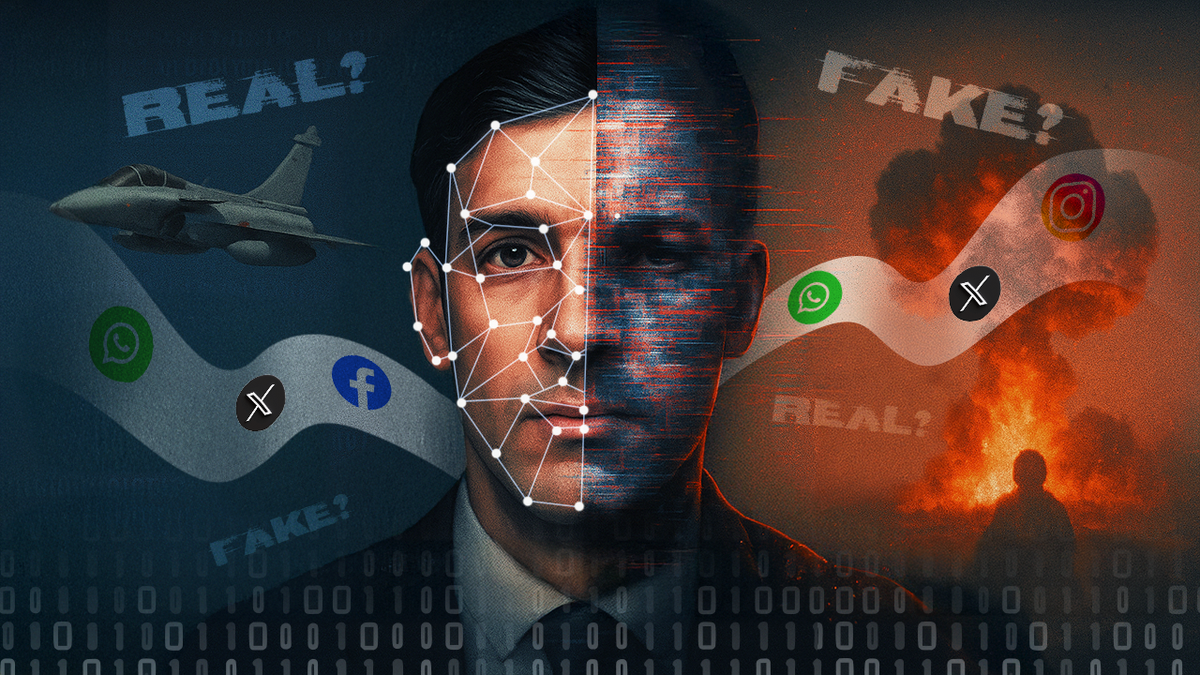Highlights
- 1 Misinformation and AI: A New Challenge for India-Pakistan Relations
Misinformation and AI: A New Challenge for India-Pakistan Relations
Misinformation is prevalent in the age of AI and can create illusions that are often more deceptive than reality. The internet has transformed into a battleground for information, where technology clashes with truth. From viral falsehoods to real-world crises, the influence of AI in spreading misinformation has raised significant concerns.
The Recent Misinformation Surge between India and Pakistan
Amidst heightened tensions between India and Pakistan due to military conflicts, there has been a surge in misinformation through AI-generated deepfakes and digitally modified information. The team at Startup Superb analysed several noteworthy incidents:
Example 1: The Phantom Fighter Jets
A viral video claimed that Pakistan had acknowledged the loss of two JF-17 fighter jets. The content featured a person appearing to be a Pakistani Army spokesperson delivering this message. However, upon close examination by BoomLive fact-checkers, it was identified as a deepfake, showcasing misaligned lip movements alongside audio inconsistencies. Notably, Mohammed Zubair, co-founder of Alt News, highlighted the manipulated audio and inaccurate lip-syncing in a tweet, leading to the video being exposed as a fabricated story.
Example 2: Alleged Anti-India Comments from a Chinese Official
Another video emerged, depicting a Chinese official purportedly stating that “China is more devoted to Pakistan than India.” Sourced from Reddit, this clip intensified scrutiny over its validity. AI experts suggested the presence of manipulated audio overlays, highlighting a disturbing trend where authentic footage serves as a foundation for synthetic voice manipulation.
The Impact of Misinformation
Numerous similar instances have proliferated misinformation, fostering deep-seated distrust between India and Pakistan, even after debunking the original claims. A senior journalist mentioned to Startup Superb that misinformation propagates six times faster than the truth, placing the human brain at a disadvantage. Cognitive biases make individuals susceptible to deepfakes and AI-driven propaganda, and even after false claims are refuted, the residual damage persists. In this highly viral environment, the internet favours sensationalism over credible information, making it imperative for governments to regulate AI and synthetic media as vital for national security and societal stability.
Media’s TRP Dilemma: The Clash of Verification and Virality
What’s even more concerning is that these videos gained traction not only on niche Telegram groups but also among established Indian media outlets. Many of these respected news channels broadcasted or referenced these clips without adequate verification, drawn into a competition for viewership and exclusivity.
Channels that previously focused on reliability fell prey to misleading footage, mistakenly presenting video game visuals as “war zone footage” or AI-generated soldier testimonials. “The media has emerged as the initial victim and the largest promoter of synthetic deception,” articulated a senior digital forensics analyst affiliated with a fact-checking NGO.
The Erosion of Trust in the Age of the Internet
This reality has led to a growing distrust in media sources designed to provide us with accurate information. If a reputable anchor can be altered to convey inflammatory messages or if a news update can be fabricated with cinematic flair, what can we trust? The era of misinformation on the internet has advanced to a level where AI plays a role not just in reporting the news, but in reshaping it entirely. If media, governments, and individuals do not take immediate action, the distinction between truth and falsehood will blur indefinitely.
The Need for Government Regulation, Law, and Accountability
The rise of synthetic media necessitates a swift and coordinated response from governments, tech platforms, and media organisations. India must implement stringent legislation to criminalise malicious deepfakes and enforce transparency in disclosing AI-generated content. Without strong legal frameworks in place, digital impersonation will remain unchecked. Vasundhara Shankar, Managing Partner at Verum Legal, expressed that the concerns surrounding deepfakes within the context of the India-Pakistan situation extend beyond security; there exists a pressing need for legal clarity around synthetic media.
With the likelihood of a legal void not being addressed promptly, social media platforms should take proactive measures to label, demote, and eliminate falsified content—especially during episodes of geopolitical tension. Building partnerships with independent fact-checkers and developing systems for real-time detection must become essential for accountability in the age of AI, rather than optional endeavours.
